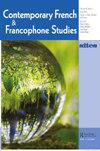Demarginalizing the Margins: Gender, Agency, and Nostalgia for French Algeria in Carnets d’Orient (Jacques Ferrandez, 2011)
IF 0.2
4区 文学
0 LITERATURE, ROMANCE
引用次数: 0
Abstract
Abstract Representations of the Other, particularly the racialized and gendered Other remains problematic for many artists, particularly in the context of representing aspects of French colonialism. This is notably the case for French pied-noir artists who set out to retrospectively tell the history of colonial Algeria. Jacques Ferrandez, a francophone pied-noir graphic novelist, published his series Carnets d’Orient between 1987 and 2009. In the second cycle, there is one single, recurring female Algerian character named Samia who will be the focus of this article. A close analysis of Samia’s representation illustrates the degrees to which the artist exploits the medium’s specificities in order to influence the message received by their readers. The reader is required to be an active co-creator and becomes implicated from an ethical point of view in that they are asked to reflect critically on their own subjectivity and biases. In the case of Carnets d’Orient, while a reading in which the Algerian woman’s agency is foregrounded is possible, we will see that instead of giving a voice to the female Algerian character, the white male pied-noir author uses her to voice a plaintive nostalgia for an Algeria which according to some “could have been.”边缘化:东方狂欢节中法属阿尔及利亚的性别、代理和怀旧(Jacques Ferrandez,2011)
对许多艺术家来说,他者的抽象表现,特别是种族化和性别化的他者,仍然是个问题,尤其是在表现法国殖民主义的背景下。尤其是法国黑色花呢艺术家,他们开始回顾阿尔及利亚殖民地的历史。Jacques Ferrandez是一位讲法语的黑色漫画小说家,他在1987年至2009年间出版了自己的系列作品《东方康乃馨》。在第二个循环中,有一个阿尔及利亚女性角色萨米亚将成为本文的焦点。对萨米亚的表现进行仔细分析,可以看出艺术家在多大程度上利用了媒介的特殊性来影响读者所收到的信息。读者被要求成为一个积极的共同创造者,并从伦理的角度受到牵连,因为他们被要求批判性地反思自己的主观性和偏见。在《东方狂欢节》的案例中,虽然阿尔及利亚女性的代理权是有可能的,但我们会看到,这位白人男性黑色皮衣作家并没有为阿尔及利亚女性角色发声,而是用她来表达对阿尔及利亚的悲伤怀念,据一些人说,阿尔及利亚“本可以”
本文章由计算机程序翻译,如有差异,请以英文原文为准。
求助全文
约1分钟内获得全文
求助全文
来源期刊

Contemporary French and Francophone Studies
LITERATURE, ROMANCE-
CiteScore
0.30
自引率
0.00%
发文量
43
期刊介绍:
An established journal of reference inviting all critical approaches on the latest debates and issues in the field, Contemporary French & Francophone Studies (formerly known as SITES) provides a forum not only for academics, but for novelists, poets, artists, journalists, and filmmakers as well. In addition to its focus on French and Francophone studies, one of the journal"s primary objectives is to reflect the interdisciplinary direction taken by the field and by the humanities and the arts in general. CF&FS is published five times per year, with four issues devoted to particular themes, and a fifth issue, “The Open Issue” welcoming non-thematic contributions.
 求助内容:
求助内容: 应助结果提醒方式:
应助结果提醒方式:


